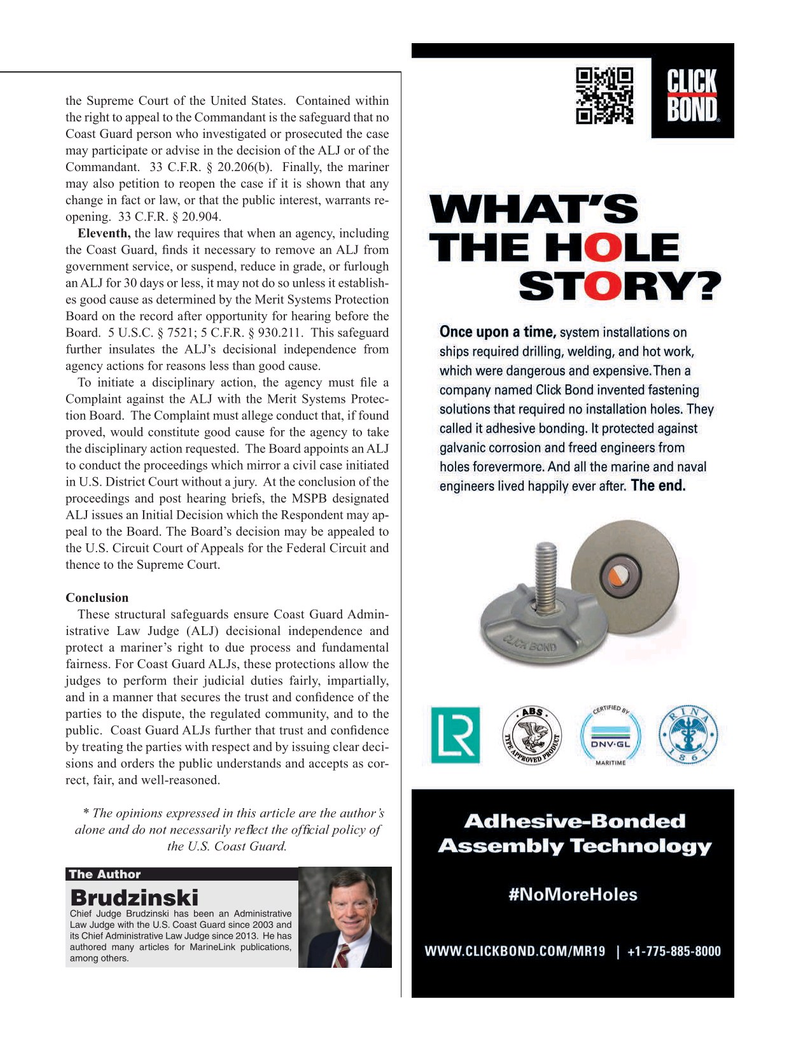
Page 21: of Maritime Reporter Magazine (November 2023)
Workboat Edition
Read this page in Pdf, Flash or Html5 edition of November 2023 Maritime Reporter Magazine
the Supreme Court of the United States. Contained within the right to appeal to the Commandant is the safeguard that no
Coast Guard person who investigated or prosecuted the case may participate or advise in the decision of the ALJ or of the
Commandant. 33 C.F.R. § 20.206(b). Finally, the mariner may also petition to reopen the case if it is shown that any change in fact or law, or that the public interest, warrants re- opening. 33 C.F.R. § 20.904.
Eleventh, the law requires that when an agency, including the Coast Guard, ? nds it necessary to remove an ALJ from government service, or suspend, reduce in grade, or furlough an ALJ for 30 days or less, it may not do so unless it establish- es good cause as determined by the Merit Systems Protection
Board on the record after opportunity for hearing before the
Board. 5 U.S.C. § 7521; 5 C.F.R. § 930.211. This safeguard further insulates the ALJ’s decisional independence from agency actions for reasons less than good cause.
To initiate a disciplinary action, the agency must ? le a
Complaint against the ALJ with the Merit Systems Protec- tion Board. The Complaint must allege conduct that, if found proved, would constitute good cause for the agency to take the disciplinary action requested. The Board appoints an ALJ to conduct the proceedings which mirror a civil case initiated in U.S. District Court without a jury. At the conclusion of the proceedings and post hearing briefs, the MSPB designated
ALJ issues an Initial Decision which the Respondent may ap- peal to the Board. The Board’s decision may be appealed to the U.S. Circuit Court of Appeals for the Federal Circuit and thence to the Supreme Court.
Conclusion
These structural safeguards ensure Coast Guard Admin- istrative Law Judge (ALJ) decisional independence and protect a mariner’s right to due process and fundamental fairness. For Coast Guard ALJs, these protections allow the judges to perform their judicial duties fairly, impartially, and in a manner that secures the trust and con? dence of the parties to the dispute, the regulated community, and to the public. Coast Guard ALJs further that trust and con? dence by treating the parties with respect and by issuing clear deci- sions and orders the public understands and accepts as cor- rect, fair, and well-reasoned.
* The opinions expressed in this article are the author’s alone and do not necessarily re? ect the of? cial policy of the U.S. Coast Guard.
The Author
Brudzinski
Chief Judge Brudzinski has been an Administrative
Law Judge with the U.S. Coast Guard since 2003 and its Chief Administrative Law Judge since 2013. He has authored many articles for MarineLink publications, among others.
MR #11 (18-33).indd 21 11/7/2023 11:54:15 AM

 20
20

 22
22
